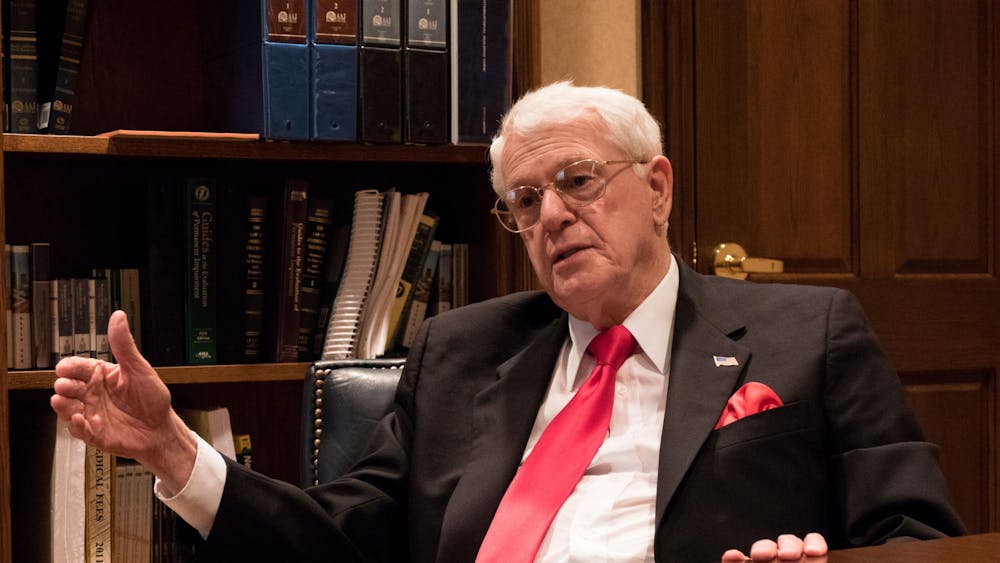Many people spend their entire lives working just to bring home a paycheck. Others work because they love what they do. \nProfessor Henry Glassie, from IU's Folklore Institute, is one of those people.\nGlassie, along with six other U.S. college professors, has been nominated to the National Council on the Humanities by President Bill Clinton.\nThe National Council for the Humanities will be a part of the National Endowment for the Humanities, which was established in the 1970s, Glassie said. The National Endowment for the Humanities was originally intended to give funding to colleges and various organizations to support the arts and humanities, he said.\nAccording to a press release, the council will be responsible for advising the National Endowment for the Humanities Chair on policies and programs regarding the humanities and the arts\nGlassie said the National Endowment for the Humanities and the council are ways for the government to protect culture and art around the nation. He said Americans have always perceived culture as a private or local interest. Other nations often treat the humanities as a public good.\nGlassie said working on the committee could mean a number of things, and he does not know what to expect if appointed officially to the council.\n"It depends on what happens politically the next four years whether it will be an honor for me and the University or a lot of hard work," Glassie said.\nHe said he has a feeling that he was nominated to the committee because Clinton's administration was looking for people in the field of the humanities who firmly believe in their cause and who would fight to protect the humanities.\n"Somebody probably accurately thinks I might be feisty enough, if necessary," Glassie said.\nGlassie said the humanities have received a lot of opposition in the past from conservative congressmen who want to cut funding for the arts and humanities, and this opposition is what the council could face if conservatives are elected, he said. \n"I have a feeling if Gore wins the presidency, then what I will do will be kind of decorative," he said.\nGlassie said for the past couple of weeks, he has been busy filling out endless forms and answering surveys sent by the Federal Bureau of Investigation as background checks on his character and his career. He said the FBI has also interviewed several of his colleagues, co-workers and friends.\nGregory Schremp, associate professor of folklore and a colleague of Glassie, said members of the folklore department are pleased with Glassie's nomination.\n"His nomination will be welcomed not only by his academic colleagues, but also by artists throughout the world who have been a part of Henry's many research, museum and teaching projects," Schremp said.\nGlassie first came to IU to teach folklore as a visiting professor in 1967, he said. In 1970 he was officially hired by the Folklore Institute, one of the nation's best folklore institutes, he said. He taught at IU from 1970 to 1975, but he left to teach folklore at the University of Pennsylvania in 1975, Glassie said.\nIt was not until 1988, with the help of then-president Tom Ehrlich, that he decided to return to IU. He was hired on with the title of college professor, which he said gave him the room not only too teach but also time and money to work on various projects.\nOne of Glassie's objectives working at the Folklore Institute is helping international students studying folklore adjust to life in the United States and help them finish their studies and return to their respective countries to teach and work in the field of folklore. He said many of these students come to IU because of the high-ranking the Folklore Institute has received worldwide.\nGlassie has published 17 books. His favorite three are "Passing the Time in Balley Menone," a book on his work in a small Northern Ireland community, "Turkish Traditional Art today," a 1,000-page book on his experiences and work in Turkey and "Art and Life in Bangladesh."\n"I love to write," he said. "It's my craft. It's fun; it's exhilarating."\nGlassie said his work is focused on the common man in countries in the middle of religious and cultural conflict. He said his studies are mainly on the religions of the world and on cultures in these conflicts. \nHe said he has worked and taught in these communities and helped in various projects in the country's museums.\n"It has to do with why I have been chosen," Glassie said. "I think what they liked is my commitment to regular people, my commitment to what regular people do as excellent and beautiful."\nGlassie has conducted extensive research and work in Northern Ireland, Bangladesh, Turkey and India. He said he is working and studying Buddhism in Japan.\n"My purpose is to learn how people practice and how they turn religious principles into works of art," he said.\nSandra Dolby, folklore professor and a co-worker of Glassie, said one of Glassie's best contributions to folklore and the humanities is his work uncovering the artistic products and performances of the common people in civilizations that are often neglected and undervalued.\n"His many fine books, his research and his involvement in creating effective museum exhibits all reflect his own brand of activism -- an effort to foster appreciation for the skills and feelings that lie behind folk performances wherever they are found and an effort to bring more of the world's bounty into the lives of the people who produce the folklore he studies," Dolby said.\nGlassie said he will not know whether he will be on the committee until after the Senate votes to approve him after reviewing the information received by the FBI. He said he should find out within a couple weeks.\n"His commitment to goals I associate with the National Council on the Humanities is long-standing," Dolby said. "He will serve us well"
Professor named as nominee
Folklore Institute's Henry Glassie nominated to National Council on the Humanities
Get stories like this in your inbox
Subscribe





